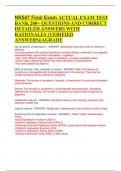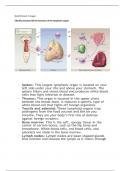NR547 Final Exam ACTUAL EXAM TEST
BANK 200+ QUESTIONS AND CORRECT
DETAILED ANSWERS WITH
RATIONALES (VERIFIED
ANSWERS)|AGRADE
key symptoms of depression: - ANSWER- depressed mood and a loss of interest or
pleasure
-may also present with physical symptoms, including fatigue, inattention, poor appetite,
decreased libido, psychomotor retardation, or agitation
-often report difficulty sleeping, lack of motivation, or trouble completing tasks
-severe cases, depressed clients may report delusions or hallucinations
-may even present as catatonia
MDD by severity: mild, moderate, or severe - ANSWER- Mild: The intensity of
symptoms is manageable with minimal impairment in functioning. There are few
symptoms beyond those required for diagnosis.
Moderate: The number of symptoms, intensity, or impairment in functioning is between
mild and severe.
Severe: The intensity of symptoms is unmanageable and distressing. Symptoms
interfere with functioning. The number of symptoms is beyond what is required for
diagnosis.
melancholic features - ANSWER- Symptoms worse in the morning, excessive guilt,
significant weight loss
atypical features - ANSWER- Weight gain, hypersomnia, heavy feeling in arms or legs
Screening tools for depression severity - ANSWER- -Patient Health Questionnaire
(PHQ)
-Beck Depression Inventory-II (BDI-II)
-Hamilton Depression Rating Scale (HAM-D)
-Edinburgh Postnatal Depression Scale (EPDS) in post-partum and pregnant women
-Children's Depression Inventory (CDI)
-Children's Depression Rating Scale (CDRS)
-Geriatric Depression Scale (GDS) in older adults
,The United States Preventive Services Task Force (USPSTF) recommends depression
screening: - ANSWER- for adults 18 years of age or older and adolescents ages 12-18
years old.
The American Academy of Family Physicians recommends screening for depression in:
- ANSWER- the general adult population, including pregnant and post-partum women.
The American Academy of Pediatrics recommends maternal screening for postpartum
depression at: - ANSWER- infants' 1, 2, and 4- month visits.
The American Academy of Pediatrics' Bright Futures program recommends: (screenin) -
ANSWER- annual screening in adolescent clients for emotional and behavioral
problems.
Medicaid's child health component, the Early and Periodic Screening, Diagnosis and
Treatment program recommends: - ANSWER- screening to detect physical and mental
conditions at various age intervals. If a risk is identified, the provider should follow up
with diagnosis and treatment.
Immuno-Psychiatry (neuroimmunology) - ANSWER- explores how the immune system
interacts with the brain and the mind
-This interaction can affect both physical and mental health
-The immune system protects the body from infection
• Macrophages are the centurions of the immune system. Macrophages warn the
immune system of a potential threat by secreting cytokines alerting more macrophages
to come to the injured site
• Cytokines (inflammatory proteins in the blood) can send signals across the blood-brain
barrier.
• Nerve cells exposed to cytokines are more likely to die than regenerate
• In rat studies, rats injected with cytokines exhibited social withdrawal, less movement,
and altered sleeping and eating patterns.
• Inflamed nerve cells cannot effectively transmit 5-hydroxytryptamine (5HT) or
serotonin receptors.
• Persons with inflammatory conditions are significantly more depressed than the
general population.
*People who frequently eat foods known to cause inflammation (carbs) are more likely
to exhibit depressive symptoms
• People tend to feel better when they eat clean, possibly due to the decreased
inflammation
Medical Diagnoses that Mimic Depressive Disorders - ANSWER- hypothyroidism
vitamin D deficiency
anemia
chronic fatigue syndrome
,Medications with side effects mimicking depression include: - ANSWER- cannabis,
alcohol, clonidine, antidepressants, anticonvulsants, antimigraine agents,
corticosteroids, contraceptives, and varenicline (Chantix)
Depression treatment: pharmacological - ANSWER- Selective Serotonin Reuptake
Inhibitors (SSRIs)
Serotonin Norepinephrine Reuptake Inhibitors (SNRIs)
Tricyclic Antidepressants (TCAs)
Monoamine Oxidase Inhibitors (MAOIs)
Must Not Miss Diagnosis: BD - ANSWER- Clients with bipolar disorder may present
during the depressive phase
-may not report any symptoms of hypomanic or manic episodes
• provider must obtain a careful history from the client and/or family members to
differentiate between bipolar disorder and depression
-Bipolar disorder should be ruled out as a cause of depression before prescribing
medication as certain antidepressant medications can precipitate a manic episode or
induce rapid-cycling bipolar depression
Medications for depression - ANSWER- SSRIs
SNRIs
SDRIs
TCAs
MAOIs
SSRIs - ANSWER- -Action: inhibit 5-HT reuptake
-Examples: citalopram, escitalopram, fluoxetine, paroxetine, sertraline
-Adverse effects:
• nausea
• agitation
• diarrhea
• headache
• weight gain
• sexual side effects
SNRIs - ANSWER- -inhibit 5-HT reuptake
-inhibit NE reuptake (↑ energy, focus)
-increase DA in prefrontal cortex (↑ cognition)
-Examples: desvenlafaxine, duloxetine, levomilnacipran, venlafaxine
-Adverse effects:
• elevated blood pressure
• nausea
• sweating
• tremors
• anxiety
• insomnia
, • constipation
• anorexia
• sexual dysfunction
SDRIs - ANSWER- -inhibit DA reuptake (↑alertness, motivation)
-inhibit NE reuptake (↑energy)
-Adverse effects:
• agitation
• headache
• dry mouth
• constipation
• weight loss
TCAs - ANSWER- -Action: inhibits the reuptake of serotonin and norepinephrine; blocks
norepinephrine, histamine, and acetylcholine receptors
-Examples: amitriptyline, clomipramine, desipramine, doxepin
-Common Side Effects:
• dry mouth
• constipation
• blurred vision
• urinary retention
• sedation
• weight gain
• hypotension
• tachycardia
• sexual dysfunction
MAOIs - ANSWER- -Action: increases norepinephrine and serotonin by inhibiting the
enzyme that inactivates it
-Examples: isocarboxazid, phenelzine, tranylcypromine
-Common Side Effects:
• sedation
• dizziness
• sexual dysfunction
• hypertensive crisis
Prescribing pearls: citalopram (Celexa) - ANSWER- mild antihistamine effects
Prescribing pearls: escitalopram (Lexapro) - ANSWER- no known drug interactions
Prescribing pearls: fluoxetine (Prozac) - ANSWER- longest half-life
Prescribing pearls: paroxetine (Paxil) - ANSWER- also treats social anxiety and
insomnia






